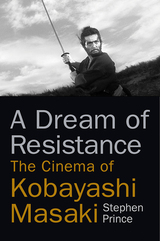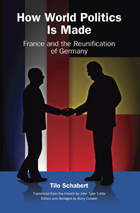2 books about 1916-1996

A Dream of Resistance
The Cinema of Kobayashi Masaki
Prince, Stephen
Rutgers University Press, 2017
Celebrated as one of Japan’s greatest filmmakers, Kobayashi Masaki’s scorching depictions of war and militarism marked him as a uniquely defiant voice in post-war Japanese cinema. A pacifist drafted into Japan’s Imperial Army, Kobayashi survived the war with his principles intact and created a body of work that was uncompromising in its critique of the nation’s military heritage. Yet his renowned political critiques were grounded in spiritual perspectives, integrating motifs and beliefs from both Buddhism and Christianity.
A Dream of Resistance is the first book in English to explore Kobayashi’s entire career, from the early films he made at Shochiku studio, to internationally-acclaimed masterpieces like The Human Condition, Harakiri, and Samurai Rebellion, and on to his final work for NHK Television. Closely examining how Kobayashi’s upbringing and intellectual history shaped the values of his work, Stephen Prince illuminates the political and religious dimensions of Kobayashi’s films, interpreting them as a prayer for peace in troubled times. Prince draws from a wealth of rare archives, including previously untranslated interviews, material that Kobayashi wrote about his films, and even the young director’s wartime diary. The result is an unprecedented portrait of this singular filmmaker.
A Dream of Resistance is the first book in English to explore Kobayashi’s entire career, from the early films he made at Shochiku studio, to internationally-acclaimed masterpieces like The Human Condition, Harakiri, and Samurai Rebellion, and on to his final work for NHK Television. Closely examining how Kobayashi’s upbringing and intellectual history shaped the values of his work, Stephen Prince illuminates the political and religious dimensions of Kobayashi’s films, interpreting them as a prayer for peace in troubled times. Prince draws from a wealth of rare archives, including previously untranslated interviews, material that Kobayashi wrote about his films, and even the young director’s wartime diary. The result is an unprecedented portrait of this singular filmmaker.
[more]

How World Politics Is Made
France and the Reunification of Germany
Tilo Schabert
University of Missouri Press, 2009
With the collapse of the Soviet Union and its Eastern European bloc, the reunification of Germany was a major episode in the history of modern Europe—and one widely held to have been opposed by that country’s centuries-old enemy, France. But while it has been previously believed that French President François Mitterrand played a negative role in events leading up to reunification, Tilo Schabert shows that Mitterrand’s main concern was not the potential threat of an old nemesis but rather that a reunified Germany be firmly anchored in a unified Europe.
Widely acclaimed in Europe and now available in English for the first time, How World Politics Is Made blends primary research and interviews with key actors in France and Germany to take readers behind the scenes of world governments as a new Europe was formed. Schabert had unprecedented, exclusive access to French presidential archives and here focuses on French diplomacy not only to dispel the notion that Mitterrand was reluctant to accept reunification but also to show how successful he was in bringing it about.
Although accounts of U.S. officials regarding the reunification of Germany boast of American leadership that guided European affairs, Schabert offers a Continental perspective that is far more complex. He reveals the constructive role played by France as he re-creates not only French cabinet meetings but also communications between Mitterrand and George H. W. Bush, Mikhail Gorbachev, Helmut Kohl, Margaret Thatcher, and other world leaders. Along the way, he provides new insight into such major episodes as the fall of the Berlin Wall, European Council summits, the German-Polish border dispute, Germany’s membership in NATO, and the final settlement of reunification.
Schabert’s work is a major piece of scholarship that clearly shows the decisive role that France played in the orchestration of German reunification—by making the “German question” a European question. A primary source in its own right, this book dramatically reshapes our understanding of not only reunification but also the end of the Cold War and the construction of a New Europe.
[more]
READERS
Browse our collection.
PUBLISHERS
See BiblioVault's publisher services.
STUDENT SERVICES
Files for college accessibility offices.
UChicago Accessibility Resources
home | accessibility | search | about | contact us
BiblioVault ® 2001 - 2024
The University of Chicago Press









